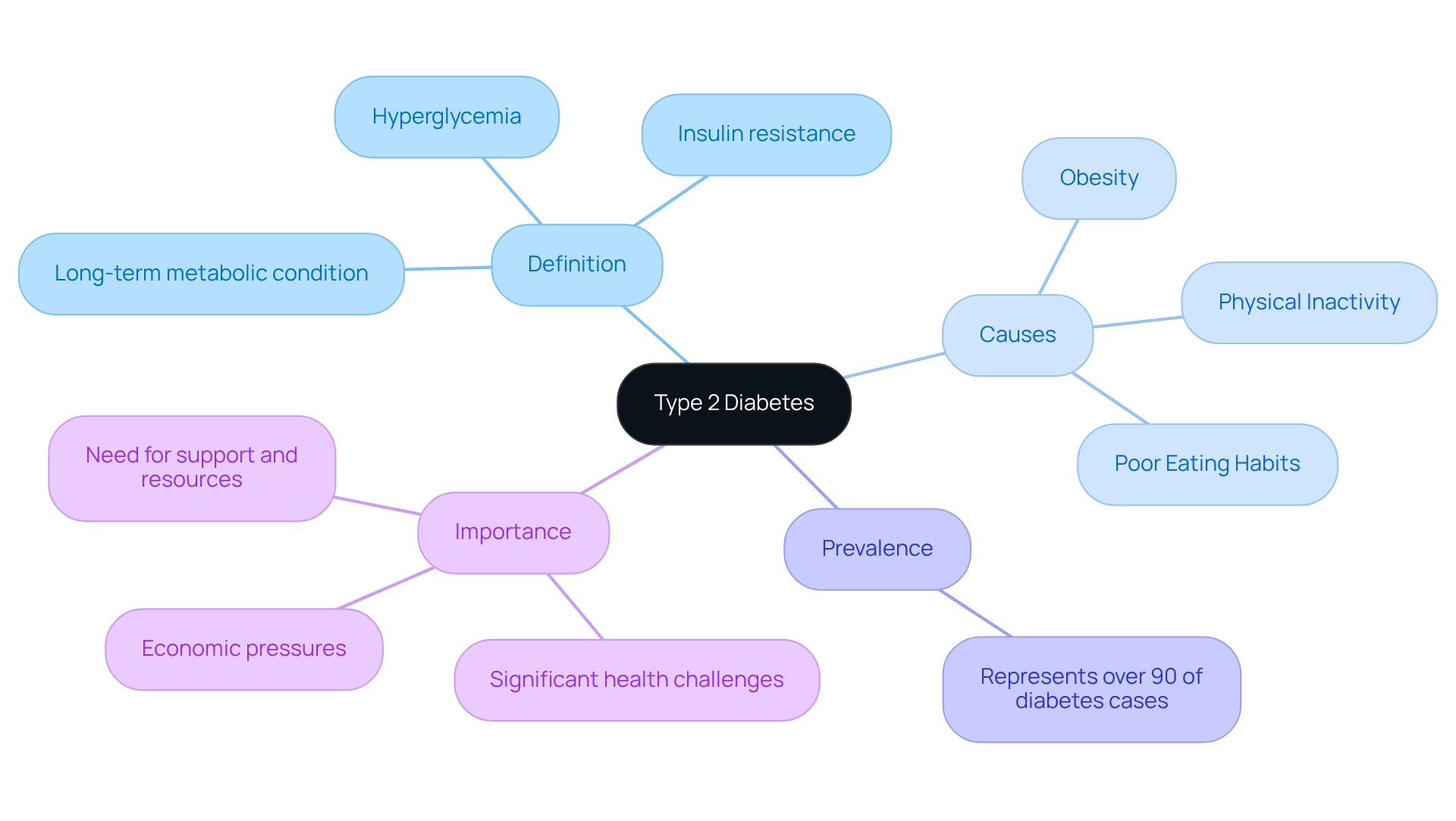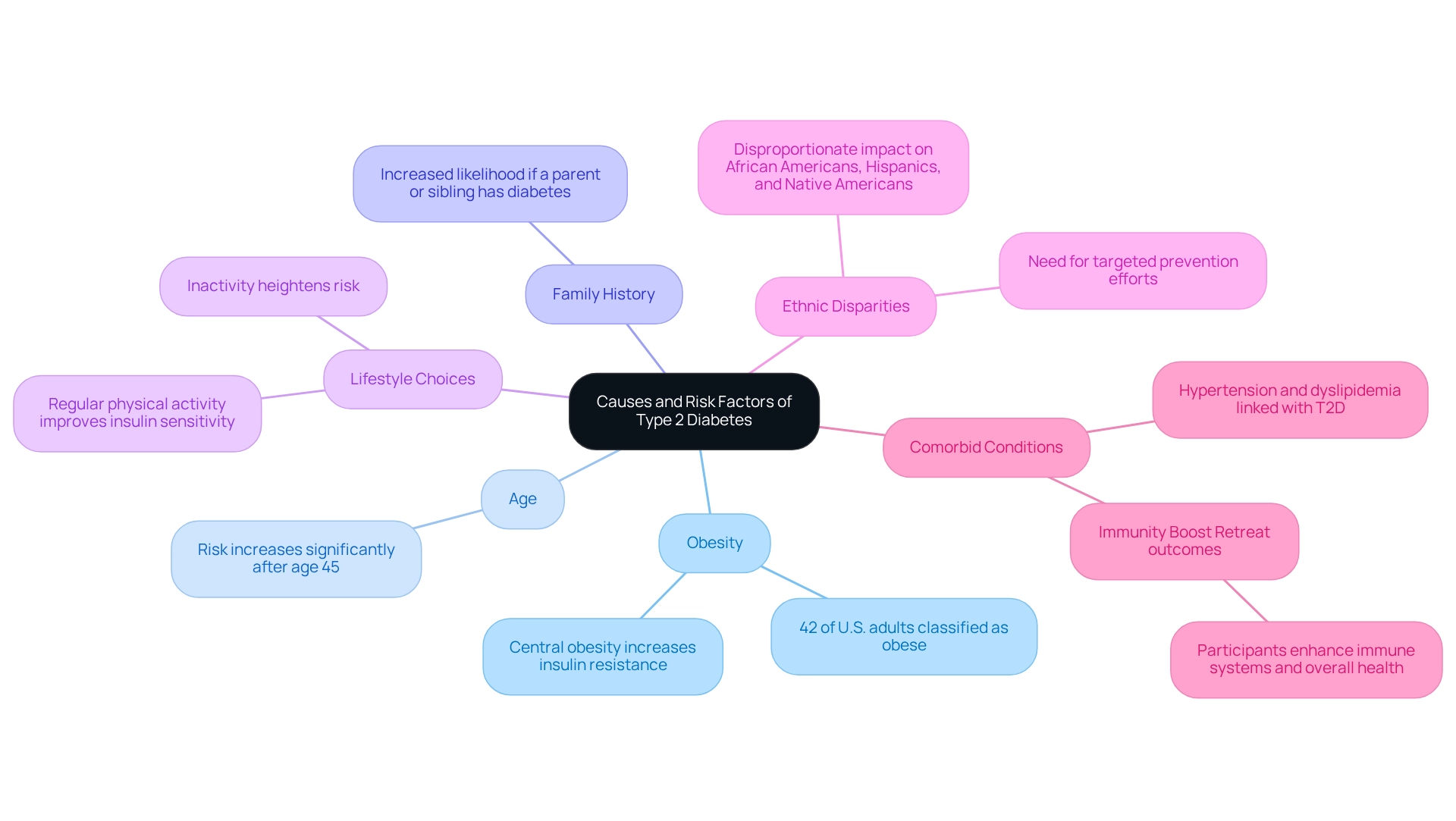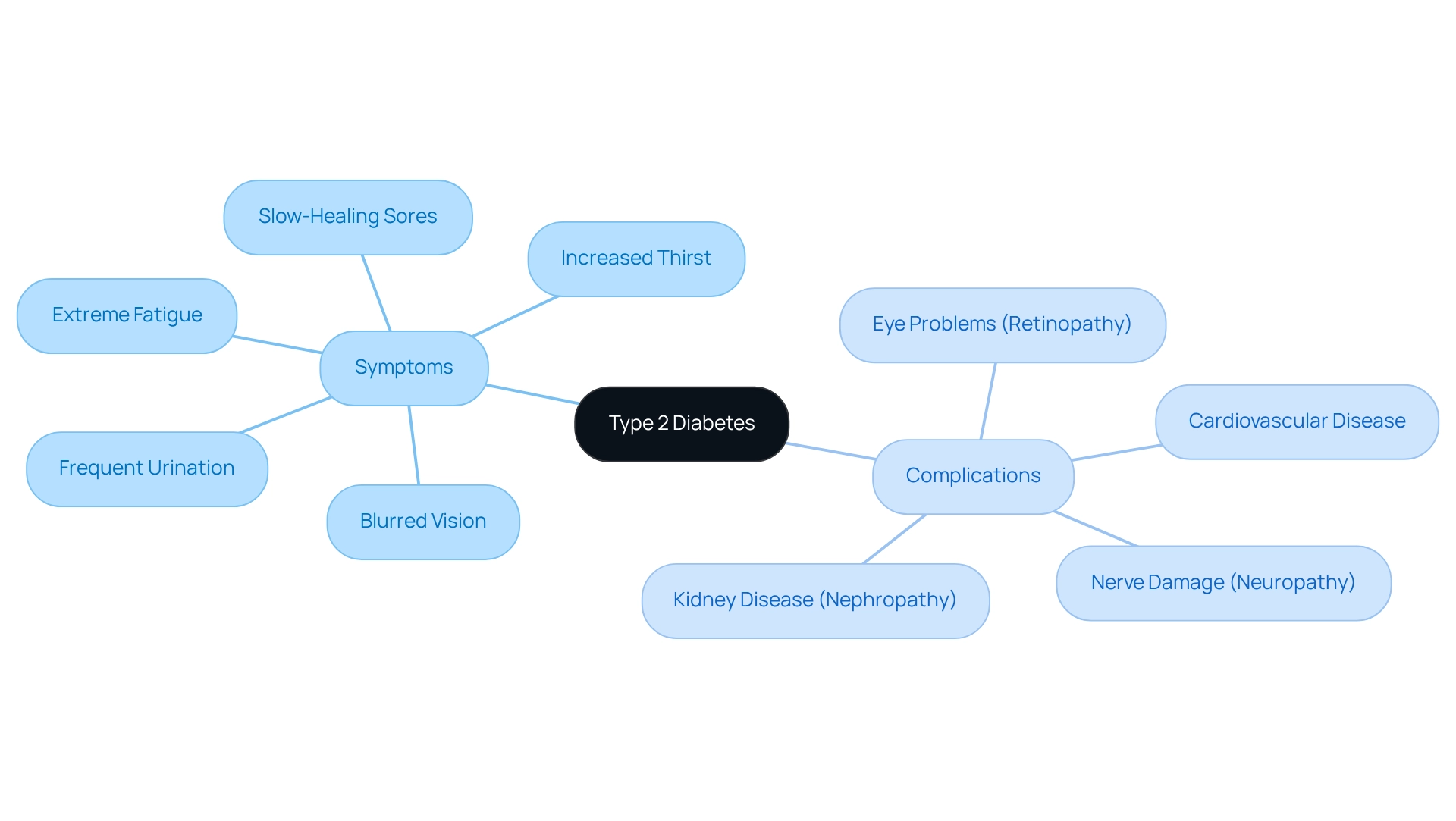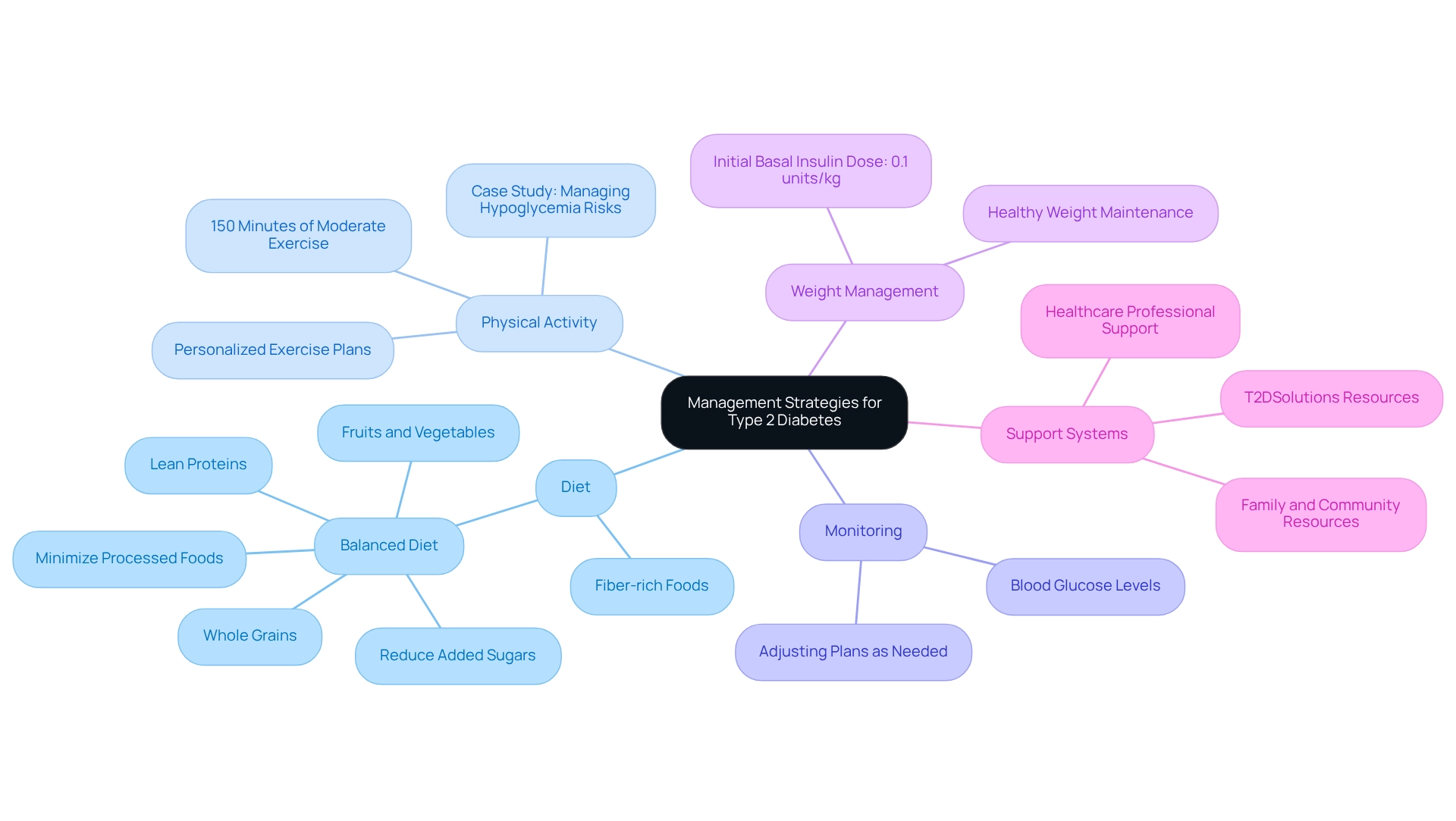Overview
Type 2 diabetes is a long-term metabolic condition that can feel overwhelming. It is characterized by insulin resistance and a relative deficiency of insulin, leading to elevated blood sugar levels. This condition is closely linked to lifestyle factors, such as obesity and inactivity. Understanding Type 2 diabetes is vital, not only because of its prevalence but also due to its significant health implications.
It's understandable to feel concerned about managing this condition. The good news is that effective management strategies exist. Simple dietary changes and regular exercise can help mitigate risks and improve overall health outcomes. Remember, you are not alone in this journey. Many have walked this path and found ways to thrive.
We encourage you to explore resources and support options available to you. Sharing experiences with others can foster a sense of community and connection. Together, we can navigate the challenges of Type 2 diabetes, ensuring that you feel heard and supported every step of the way.
Introduction
In a world where chronic diseases are increasingly prevalent, Type 2 Diabetes (T2D) emerges as a significant public health challenge, impacting millions around the globe. This condition, characterized by insulin resistance and often linked to lifestyle choices, not only affects individuals' health but also places a heavy burden on our healthcare systems. It's understandable to feel overwhelmed by the complexities of T2D, but understanding its causes, risk factors, and symptoms is essential for effective management and prevention.
The alarming connection between rising obesity rates and T2D prevalence highlights the urgency of this issue. However, there is hope. By making essential lifestyle adjustments, individuals can pave the way toward better health outcomes. This article delves into the intricacies of Type 2 Diabetes, offering insights and strategies that can empower those affected and their communities as they strive to combat this growing epidemic. Remember, you are not alone in this journey; we are here to support you every step of the way.
Define Type 2 Diabetes: A Comprehensive Overview
Type 2 diabetes what is it? It is a long-term metabolic condition characterized by insulin resistance and a relative lack of insulin, resulting in elevated blood sugar levels, known as hyperglycemia. It's important to understand that unlike the first form of diabetes, which primarily stems from autoimmune issues, T2D often develops gradually and is closely linked to lifestyle factors such as obesity, physical inactivity, and poor eating habits.
Type 2 diabetes, what is it, is the most common form of diabetes, representing over 90% of all diabetes cases worldwide. Understanding T2D is vital—not just for those diagnosed, but also for healthcare professionals and policymakers. This condition poses significant health challenges and economic pressures on a global scale.
It's understandable to feel overwhelmed by this information; however, you're not alone in this journey. Many resources are available to support you, and it's crucial to seek out the help you need. Remember, we are here to support you every step of the way.

Identify Causes and Risk Factors of Type 2 Diabetes
Understanding the causes of type 2 diabetes is important, as they are intricate and influenced by various factors. One of the main contributing factors is obesity, particularly central obesity, which significantly increases insulin resistance. Current statistics reveal that approximately 42% of adults in the U.S. are classified as obese. This highlights a concerning correlation between rising obesity rates and the prevalence of T2D. As obesity rates continue to climb, so does the incidence of T2D, making it crucial to address this issue proactively.
Age plays a critical role in the risk of developing T2D, with the likelihood rising significantly after the age of 45. Family background is another important element; if you have a parent or sibling diagnosed with diabetes, your likelihood increases. Lifestyle choices, especially inactivity, further heighten this risk. Engaging in regular physical activity is essential for maintaining a healthy weight and improving insulin sensitivity.
Certain ethnic groups, including African Americans, Hispanics, and Native Americans, are disproportionately affected by T2D. This underscores the importance of targeted prevention efforts in these communities. As noted by the Wellness Center at Atmantan, "He felt extremely hopeful and motivated to get better now," which highlights the need for support and resources tailored to these populations.
Comorbid conditions like hypertension and dyslipidemia are often linked with T2D, creating a complex interaction that complicates management and heightens health challenges. For instance, participants in the "Immunity Boost Retreat" have reported enhanced immune systems and overall health during a 7-night stay, illustrating the benefits of addressing comorbid conditions.
By understanding these risk factors and the latest research on obesity and type 2 diabetes, you can take proactive steps toward prevention and early intervention. Remember, you're not alone in this journey, and there are resources available to support you every step of the way. Together, we can enhance health outcomes and foster a healthier future.

Recognize Symptoms and Complications of Type 2 Diabetes
Recognizing the signs and complications of this condition is crucial for your health journey. Signs of this illness can develop gradually and may include:
- Increased thirst
- Frequent urination
- Extreme fatigue
- Blurred vision
- Slow-healing sores
It’s understandable to feel overwhelmed by these symptoms, but knowing what to look for is the first step toward managing your health, particularly in relation to type 2 diabetes. As left unmanaged, this condition can lead to severe complications such as:
- Cardiovascular disease
- Nerve damage (neuropathy)
- Kidney disease (nephropathy)
- Eye problems (retinopathy)
These complications can greatly affect your quality of life and increase healthcare expenses. Early identification and management are vital for individuals who may be vulnerable.
At T2DSolutions, we aim to be a valuable resource for newly diagnosed patients like you. We provide education and support to help you manage these symptoms and complications effectively. Remember, you’re not alone in this journey; we are here to support you every step of the way.

Explore Management Strategies and Lifestyle Adjustments for Type 2 Diabetes
Effectively managing type 2 diabetes requires a multifaceted approach that combines lifestyle adjustments with medical interventions. A balanced diet is foundational; it should be rich in whole grains, fruits, vegetables, and lean proteins while minimizing processed foods and added sugars. Recent dietary recommendations for 2025 emphasize the importance of incorporating fiber-rich foods, which can significantly aid in blood sugar control and overall health. At T2DSolutions, we offer resources and guidance to help newly diagnosed patients navigate these dietary changes.
It's equally crucial to engage in regular physical activity. Aim for at least 150 minutes of moderate exercise each week, as this has been shown to enhance insulin sensitivity and improve glycemic control. For instance, a case study on managing hypoglycemia risks highlighted the importance of individualized exercise plans, particularly for frail patients, to ensure safety and effectiveness. T2DSolutions provides tailored exercise recommendations and support to help you create safe and effective fitness routines.
Monitoring your blood glucose levels is vital for understanding how lifestyle changes impact diabetes management. Maintaining a healthy weight and adhering to prescribed medications, when necessary, are also key components of a successful management strategy. The Diabetes Prevention Program (DPP) demonstrated a 58% reduction in the incidence of type 2 diabetes among participants undergoing combined lifestyle interventions, highlighting the effectiveness of these strategies. T2DSolutions can assist you in tracking your progress and adjusting your plans as needed.
Support from healthcare professionals, family, and community resources can further enhance your management journey. Expert advice on lifestyle changes emphasizes the need for personalized plans that consider your individual circumstances and preferences. Real-world examples of dietary changes, such as increasing vegetable intake or reducing sugary beverages, have shown positive effects on blood sugar levels and overall well-being. Additionally, the recommended initial basal insulin dose of 0.1 units/kg daily for certain patient conditions highlights the importance of medical interventions in conjunction with lifestyle adjustments. By adopting these effective management strategies and utilizing the resources available through T2DSolutions, you can take proactive steps toward better health and improved quality of life. Remember, you're not alone in this journey; we are here to support you every step of the way.

Conclusion
The complexities surrounding Type 2 Diabetes (T2D) highlight an urgent need for awareness and proactive measures. By understanding T2D as a chronic metabolic disorder, we can recognize its causes, risk factors, and symptoms. This knowledge is critical for appreciating the importance of early intervention and lifestyle management. With obesity being a significant risk factor, it becomes paramount to address lifestyle choices such as diet and physical activity. The alarming statistics on obesity rates serve as a call to action for both individuals and communities.
Recognizing the symptoms and potential complications of T2D is essential for timely management. By taking steps to manage blood glucose levels and adopting a healthy lifestyle, individuals can significantly improve their health outcomes. Engaging in regular physical activity, maintaining a balanced diet, and utilizing available resources for support can empower those affected by T2D to take control of their health.
Ultimately, the journey toward managing Type 2 Diabetes is not one that needs to be faced alone. With a supportive network and access to effective management strategies, individuals can navigate the challenges of T2D and work towards a healthier future. Emphasizing the importance of education, community support, and personalized plans can lead to improved quality of life and reduced healthcare burdens for individuals and society as a whole. Remember, the fight against T2D is a collective effort, and every step taken towards awareness and action truly counts. You're not alone in this journey; we are here to support you every step of the way.
Frequently Asked Questions
What is Type 2 diabetes?
Type 2 diabetes (T2D) is a long-term metabolic condition characterized by insulin resistance and a relative lack of insulin, leading to elevated blood sugar levels, known as hyperglycemia.
How does Type 2 diabetes differ from Type 1 diabetes?
Unlike Type 1 diabetes, which primarily stems from autoimmune issues, Type 2 diabetes often develops gradually and is closely linked to lifestyle factors such as obesity, physical inactivity, and poor eating habits.
How common is Type 2 diabetes?
Type 2 diabetes is the most common form of diabetes, representing over 90% of all diabetes cases worldwide.
Why is understanding Type 2 diabetes important?
Understanding Type 2 diabetes is vital for individuals diagnosed with the condition, healthcare professionals, and policymakers, as it poses significant health challenges and economic pressures globally.
What should I do if I feel overwhelmed by information about Type 2 diabetes?
It is normal to feel overwhelmed, but many resources are available to support you. It is crucial to seek help and remember that support is available throughout your journey.



